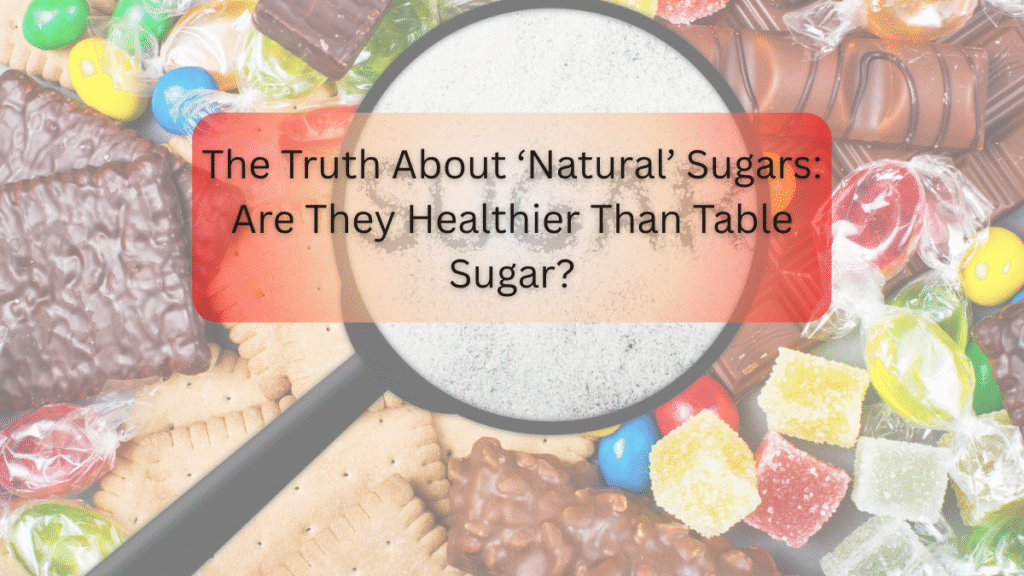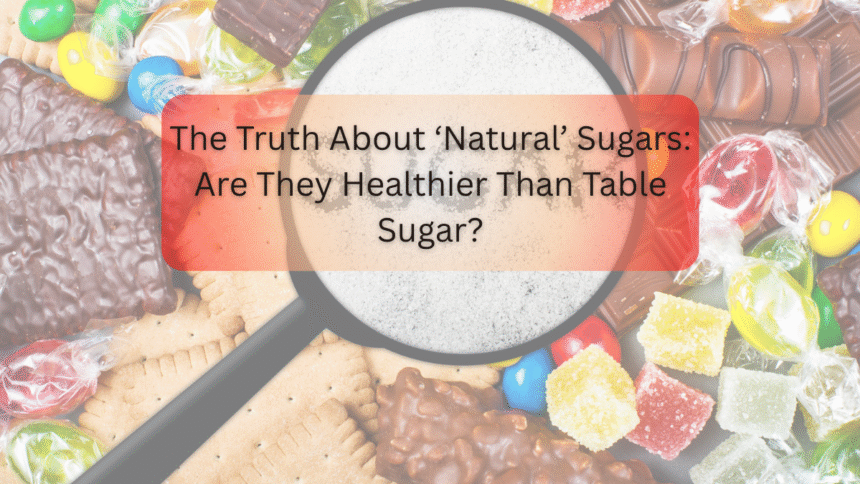Natural Sugars
We’ve all heard the buzzwords: “natural,” “unrefined,” “organic”—especially when it comes to sugar. With so many alternatives to plain white table sugar, it’s easy to assume that options like honey, maple syrup, or coconut sugar are automatically healthier. But is that really the case?
In this post, we’ll dive deep into the world of natural sugars, compare them to table sugar, and uncover whether they’re truly better for you. Plus, we’ll share practical tips to help you make smarter sugar choices without falling for marketing hype.

What Are ‘Natural’ Sugars?
When we talk about natural sugars, we’re usually referring to sweeteners that come from plants or natural sources with minimal processing. Some popular options include:
- Honey (from bees)
- Maple syrup (from maple trees)
- Coconut sugar (from coconut palm sap)
- Agave nectar (from the agave plant)
- Date sugar (from dried dates)
These alternatives are often marketed as healthier because they retain some vitamins, minerals, and antioxidants—unlike refined white sugar, which is stripped of nutrients during processing. But does that make them better for you?
Natural Sugars vs. Table Sugar: What’s the Difference?
1. Nutritional Content
Yes, natural sugars contain small amounts of nutrients:
- Honey has trace amounts of vitamins, minerals, and antioxidants.
- Maple syrup contains zinc and manganese.
- Coconut sugar has a bit of iron and potassium.
But here’s the catch: The amounts are so small that you’d have to consume a lot of these sweeteners to get any real benefit—which would mean loading up on sugar, defeating the purpose.
Bottom line: While natural sugars have some nutrients, they shouldn’t be considered a significant source of vitamins or minerals.
2. Glycemic Index (GI) and Blood Sugar Impact
Many people believe natural sugars are better for blood sugar control, but this isn’t always true.
- Table sugar (sucrose) has a GI of around 65.
- Honey ranges from 35-58 (depending on type).
- Agave nectar has a low GI (~15-20) but is very high in fructose, which may contribute to insulin resistance over time.
- Coconut sugar (~54) is slightly lower than table sugar but still impacts blood sugar.
Key takeaway: Some natural sugars have a lower GI, but they still raise blood sugar—just not as dramatically as high-fructose corn syrup or pure glucose.
3. Processing and Additives
Refined white sugar undergoes heavy processing, stripping away molasses and other compounds. Natural sugars are less processed, but some (like agave nectar) still go through significant refining.
Tip: If you’re choosing a natural sweetener, opt for raw, unprocessed versions (e.g., raw honey, pure maple syrup) to avoid added chemicals.
Video Credits
Are Natural Sugars Actually Healthier?
The short answer: Not necessarily.
While natural sugars may offer slight nutritional benefits, they’re still sugars at their core. Your body processes them similarly—breaking them down into glucose and fructose.
What matters most is:
✅ Quantity – Too much sugar (even natural kinds) can lead to weight gain, diabetes, and heart disease.
✅ Source – Whole fruits (with fiber) are better than concentrated sweeteners.
✅ Overall diet – A teaspoon of honey in tea won’t hurt, but relying on “natural” sugars as a health food might backfire.
Smart Tips for Choosing and Using Natural Sugars
If you prefer natural sweeteners, here’s how to use them wisely:
- Moderation is key – Even “healthier” sugars should be limited. The WHO recommends keeping added sugars under 6 teaspoons (25g) per day.
- Pair with fiber or protein – Combining sugar with fiber (like in fruit) or protein (like in yogurt) slows absorption and reduces blood sugar spikes.
- Watch for hidden sugars – Many “healthy” snacks (granola, flavored yogurt, energy bars) contain natural sweeteners but are still high in sugar.
- Try sugar alternatives – For a lower-calorie option, consider stevia, monk fruit, or erythritol (but research their effects first).
Final Verdict: Should You Ditch Table Sugar for Natural Sweeteners?
Natural sugars do have minor advantages over refined sugar—like trace nutrients and a slightly lower glycemic impact—but they’re not a free pass to indulge. At the end of the day, sugar is sugar, and too much of any kind can harm your health.
Best approach?
- Use natural sweeteners sparingly for flavor.
- Focus on whole foods (fruits, nuts, seeds) for sweetness.
- Read labels and avoid excessive sugar in all forms.
What’s Your Take?
Do you prefer natural sugars over table sugar? Have you noticed any differences in how they affect your energy or health? Drop a comment below—we’d love to hear your thoughts!
And if you found this post helpful, share it with a friend who’s curious about sugar alternatives. For more evidence-based nutrition tips, subscribe to our newsletter below!











